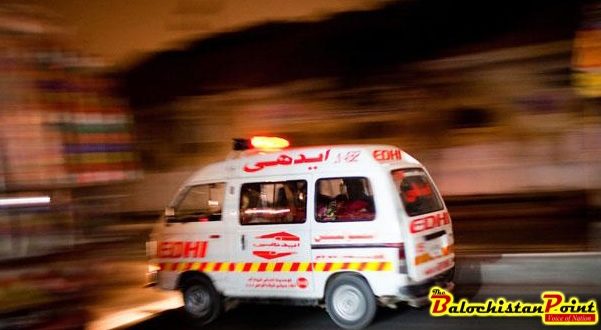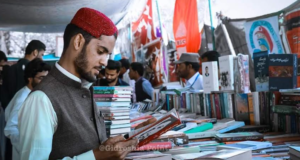By: Masmoom Shahwani
She screamed out of obstetric pain in the labour room. Perhaps these were the final hours. It was 3 o’clock in the morning. Pregnant women laboured on the beds arranged in a row at Labour Room of biggest state ran Hospital in Quetta. But the lady gynecologist, on night duty on that fateful night, had ordered nurses and midwives not to wake her up of her sleep, come what may. She had arrived on duty already two hours late and had spent remaining hours on social networking, chatting with friends, sharing videos about fashion, beauty on facebook and whatsapp and of course the newly arrived J. collections at the main Manan Chowk of Quetta. Then she had retired to her office-cum-bed room with little care if she really had a job to do.
Razia was just 14 when her parents thought she had come of age and it was their duty to find a match for her. Young Ramzan was fascinated by the beauty of Razia who was a first cousin of her and their parents shared joint orchards of juicy apples in the insurgency hit sparsely populated town of Ispilinji in Mastung. The locality is known for insurgencies of all kinds—Baloch insurgency, religious fanaticism and the repeated military operations have torn the town’s whatever institutional structure. No maternity centres, no healthcare units, no hospitals were properly functional apart from a few medical camps arranged periodically by the security men.
Dilawar Khan, father of Razia talked to his brother Nauroz Khan, and he gave Razia’s hand away to Ramzan. 10 lambs were slaughtered and entire village was invited during the wedding party of Ramzan and Razia. As the Nikkah was solemnly concluded, bullets were fired in celebration, as per the dictates of local tradition and both were happily married.
Bang, bang, bang. Three more bullet fires were heard in wee hours at that joyful night that signified the consummation of marriage as a part of a dying tradition that still livid in the rural Brauhvi tribes so to announce consummation of marriage.
Both Razia and Ramzan lived a happy life and worked together in the orchard fields for an year and half. It was the second year of their marriage when Ramzan heard the glade tiding that he was going to be father of a baby very soon. He slaughtered two lambs in thanksgiving and distributed the meat in the entire village. The elderly people congratulated him for a blessing to arrive soon with lots of giggles in his house.
“Razia we both are uneducated but we will educate our son and admit him in an ‘angerezi ischool,” Ramzan expressed his wish for his son. However, Razia couldn’t focus owing to bouts of pain, darkness that prevailed before her eyes and nausea since her pregnancy. Having no sense of all that Ramzan continued, “I will name him Mir Jangi Khan.” “Yes, Mir Jangi Khan,” he murmured to himself and left to his orchards.
One night, the pain become unbearable for Razia. Precipitation, vomiting and pain became unbearable. Ramzan, along with his mother-in-law, Dur Bibi, took Razia and rushed to the only sign of hope at that very moment, the Quetta’s biggest state-run health facility. It took them three hours to reach hospital.
Mounting off his large Pickup Datsun, that is otherwise used for agricultural transportation to Hazargunji—the provincial fruit and vegetable market, he shoutingly called please tell me where is zanana ward. But at 2 o’clock at night, only a security men guided him to take a stretcher and take the patient himself to labour room. He followed and made his way along with sobbing and crying Dur Bibi to labour room. Razia was hardly placed on a bed by a midwife present in the labour room, looking after around 6 more patients suffering obstetric labour.
Dur Bibi asked the midwife to call doctor but met a cold and rude response. ‘Dafa ho mahi. Itna bacha paida krny ka shouq hay tu private haspatal ja, dactar bibi nay mana kiya hay ke meri nend koe na kharab kary.” (Get lost and go to a private hospital if so curious to give birth to babies. Doctor mam has strictly forbidden not to disrupt her sleep).
Seeing Razing in utter pain and drenched perspiration, she came out and told Ramzan, “Kana maar, da baji kanay aa ghabart aaraha khaleq. Daksar baji e pa bary. Kana mashir kaik.” (My son, midwife talks to me so rudely. Please do something to call doctor or else my child will perish). Ramzan ran in the corridor, requested every person he thought he had some authority but to no avail. The clock struck 3o’clock in the morning when streak of blood ran down the feet of Razia and she could only utter la ilaha illallaho, and with a deep gasping breath, her heartthrob stopped all of a sudden.” Seeing this, the midwife ran to wake up sleeping gynecologist, but it was too late. She was given oxygen but to no avail as she had already expired and travelled to eternal world with unborn Mir Jangi Khan. Dur Bibi’s screams echoed, “Daksar kana masihr e kasify, Daksar Ispilinji na godi e kasify,” (Doctor killed my child, doctor killed, Isplinji’s queen).
(All the characters used in the story are imaginary to highlight a genuine issue)
Masmoom shahwani is a freelance journalist and a former reporter for many National English Dailies in Pakistan. He expresses his views on social, political, cultural and environmental issues. He can be contacted at Masmoomshahwani@gmail.com
Published in The Balochistan Point on September 11, 2017
 Balochistan Point Voice of Nation
Balochistan Point Voice of Nation




